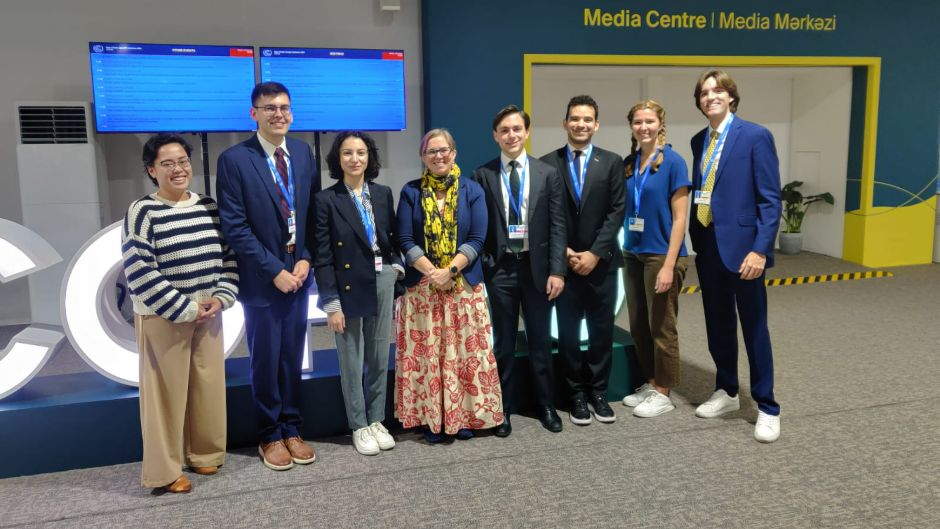In the two weeks leading up to Thanksgiving, representatives from around the globe convened in Baku, Azerbaijan, for the 29th session of climate change treaty negotiations, commonly called COP29. This year, the University of Miami delegation, led by Professor Jessica Owley, who runs the law school's Environmental Law Program, brought a renewed commitment and vigor to doing their part. Joining her were Climate Law Fellow Valerie Fajardo, a team of dedicated law students, an engineering Ph.D. student, and visiting Professor Tracy Bach, an expert on international climate law.
The UM team, known for cultivating strong connections with governments and NGOs in recent years, has taken significant strides in its engagement. Fajardo was instrumental in directly integrating students into the negotiating teams of low-lying island nations—countries acutely affected by climate change. Supporting nations Samoa and the Federated States of Micronesia, the students played valuable roles by tracking negotiation issues, polishing national statements, acting as intermediaries for negotiating text, and offering much-needed moral support.
J.D. students Alyssa Huffman, Dursun Ersoz, Patrick Roesser, Justin Alexander, John Dennis, and Quinten Smith dedicated their efforts to the Federated States of Micronesia. They focused on national priorities, including climate finance, oceans, climate technology, and transparency. J.D. students Jayson Fry and Kyra Frank worked with the lead Samoa negotiators for climate mitigation. These island nations often have fewer delegates, so the students assist in issues that cannot be covered due to limited personnel or need increased attention, making the contributions of UM students even more significant.
The delegation also continued its partnership with Miami-Dade County. Ph.D. student Danielle Bejar supported the Miami-Dade County Office of Resilience, working to bridge local efforts with international discussions, summarizing events, and fostering vital collaborations. Although local governments lack formal roles within the negotiations, their contributions are crucial as climate projects often operate at the regional level.
Additionally, new alliances were formed with the Center for International Environmental Law based in Switzerland and Aksyon Klima Pilipinas, a leading civil society network in the Philippines. S.J.D. student Lorena Zenteno and J.D. student Kyle Spohn contributed to these organizations by assisting in press events, briefing crucial topics like carbon markets and loss and damage, and attending high-level meetings on human rights and Indigenous rights. In addition, Zenteno assisted the CIEL with diverse issues surrounding rights and sustainable practices, while Spohn collaborated with Aksyon Klima Pilipinas. These environmental NGOs are integral to the COP, advocating for better policies and keeping the public engaged.
For one intensive week, each student worked tirelessly with the various delegations. The students ' dedication was commendable, with days often extending beyond 12 hours and a significant nine-hour time difference from Miami. Despite the negotiations not yielding the hoped-for results, the feedback from partners highlighted the invaluable assistance provided by UM students, leading to requests for future collaboration from both involved nations and international organizations.
The success of the delegation was rooted in rigorous preparation. Fajardo provided consistent support throughout the COP experience, while Bach's short course before the event armed the students with crucial knowledge and skills. Bach remained accessible during the negotiations, tackling the complex climate finance questions.
This year marks UM's fourth participation in COP negotiations, providing students with firsthand exposure to the intricate world of international climate diplomacy. The experience hones practical skills, expands professional networks, and enhances the students' commitment to climate action.
Learn more about UM’s COP 29 delegation on their blog.
Read more about Miami Law's Environmental Law area of study.

